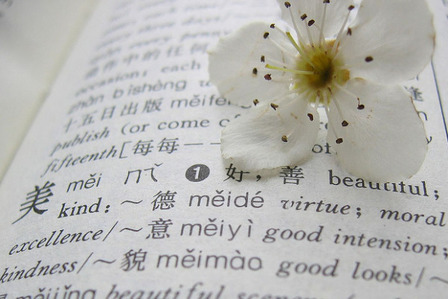 I guess everyone knows that most of the languages are quite unique, and that there must be quite a few words out there that can't be really translated into English. I've been trying to find some Hungarian words for this list too, and I admit, it was a challenge. Most of the lists I found out there had the same old words (and some of them will make it to my list, it's not about quantity tho...).
I guess everyone knows that most of the languages are quite unique, and that there must be quite a few words out there that can't be really translated into English. I've been trying to find some Hungarian words for this list too, and I admit, it was a challenge. Most of the lists I found out there had the same old words (and some of them will make it to my list, it's not about quantity tho...). This idea came to me as I watched Life in a Day. There was a girl in it, saying something about a word she finds beautiful.
And now, without any further ado, here's the list.
1. Mamihlapinatapei
From Yagan, the indigenous language of the Tierra del Fuego region of South America. This word has been translated in several ways in English, always implying a wordless yet meaningful look shared by two people who both desire to initiate something but are both reluctant to start. (I think this was the word that girl mentioned)
2. Tartle
A Scottish verb meaning to hesitate while introducing someone due to having forgotten his/her name.
3. Wabi-Sabi
It’s a way of living that emphasizes finding beauty in imperfection, and accepting the natural cycle of growth and decay. It's Japanese.
4.Toska
Russian – Vladmir Nabokov describes it best: “No single word in English renders all the shades of toska. At its deepest and most painful, it is a sensation of great spiritual anguish, often without any specific cause. At less morbid levels it is a dull ache of the soul, a longing with nothing to long for, a sick pining, a vague restlessness, mental throes, yearning. In particular cases it may be the desire for somebody of something specific, nostalgia, love-sickness. At the lowest level it grades into ennui, boredom.”
5.Dépaysement
French – The feeling that comes from not being in one’s home country.
6.Pertu
Hungarian - Pertu is a ritual, a bonding experience, much like treaties signed in blood must once have been. It signals the sincere, or strategic, desire for friendship between people and formalises their decision to be more familiar with each other, in the first instance in language.
7. L’appel du vide
French – “The call of the void” is this French expression’s literal translation, but more significantly it’s used to describe the instinctive urge to jump from high places.
8. Zalatwic
Polish - Zalatwic is the use of friends, bribes, personal charm or connections to get something done. This was particularly useful in the days of communism, as it was easier to get something you wanted through guile as opposed to official means.
9. Uitwaaien
Literally, this Dutch word means to walk in the wind, but in the more figurative (and commonly used) sense, it means to take a brief break in the country side to clear one’s head.
10. Esprit d’Escalier
Esprit d’Escalier (literally the spirit of the staircase) is that witty comeback that you think of moments after leaving the situation in which you might have been able to use it.
11. Szimpatikus
“I often find I need to say this word to an English person but can never find the right one to describe it. It describes the feeling you get when you meet a person for the first time and your intuition tells you he is a good person. You say this person’s “szimpatikus”. They seem like a decent, friendly human being. You get a ‘good vibe’ from them.”
12. Glaikit
Scots word that translates as stupid or foolish, but refers specifically to the facial expression which suggests there’s not much going on inside someone’s head or they don’t understand; like a stupid person, or a confused drunk.
13. Backpfeifengesicht
“A face badly in need of a fist.”
We’ve all met or seen that person whose face is just begging to be introduced to fist. The Germans were just smart enough to make a word to describe them.
14. Yolki-palki
Literally: fir trees and sticks
Expression of surprise, astonishment, pleasure, or the like depending on the situation. Closer to, "holy cow!" in English.
15. Bilita Mpash
Bilita Mpash means not just a good dream, but a ‘legendary, blissful state where all is forgiven and forgotten.
16. Drachenfutter
You’ve got to hand it to the German’s – they’ve really focussed their word invention around the important things in life, namely drinking. A ‘drachenfutter’ is a gift bought for a wife by a husband who has stayed out too late. Brilliantly this word literally translates as ‘dragon fodder’ and the definition has been expanded in Germany to include any present given out of guilt for having too much fun.
17. Ondinnonk
A truly uplifting word from the Iroquois tribes of North America, Ondinnonk means the soul’s innermost desires and its angelic nature. To follow one’s ondinnonk can often lead to positive and kindly acts.
18. Dor
Longing for someone you love very much, combined with sadness, and the need for singing sad songs; its etymology belongs to “dorinta” which means wish.
19. Meraki
This is a word that modern Greeks often use to describe doing something with soul, creativity, or love — when you put "something of yourself" into what you're doing, whatever it may be. Meraki is often used to describe cooking or preparing a meal, but it can also mean arranging a room, choosing decorations, or setting an elegant table.
20. Utepils
A Norwegian word to describe sitting outside on a sunny day enjoying a beer.
